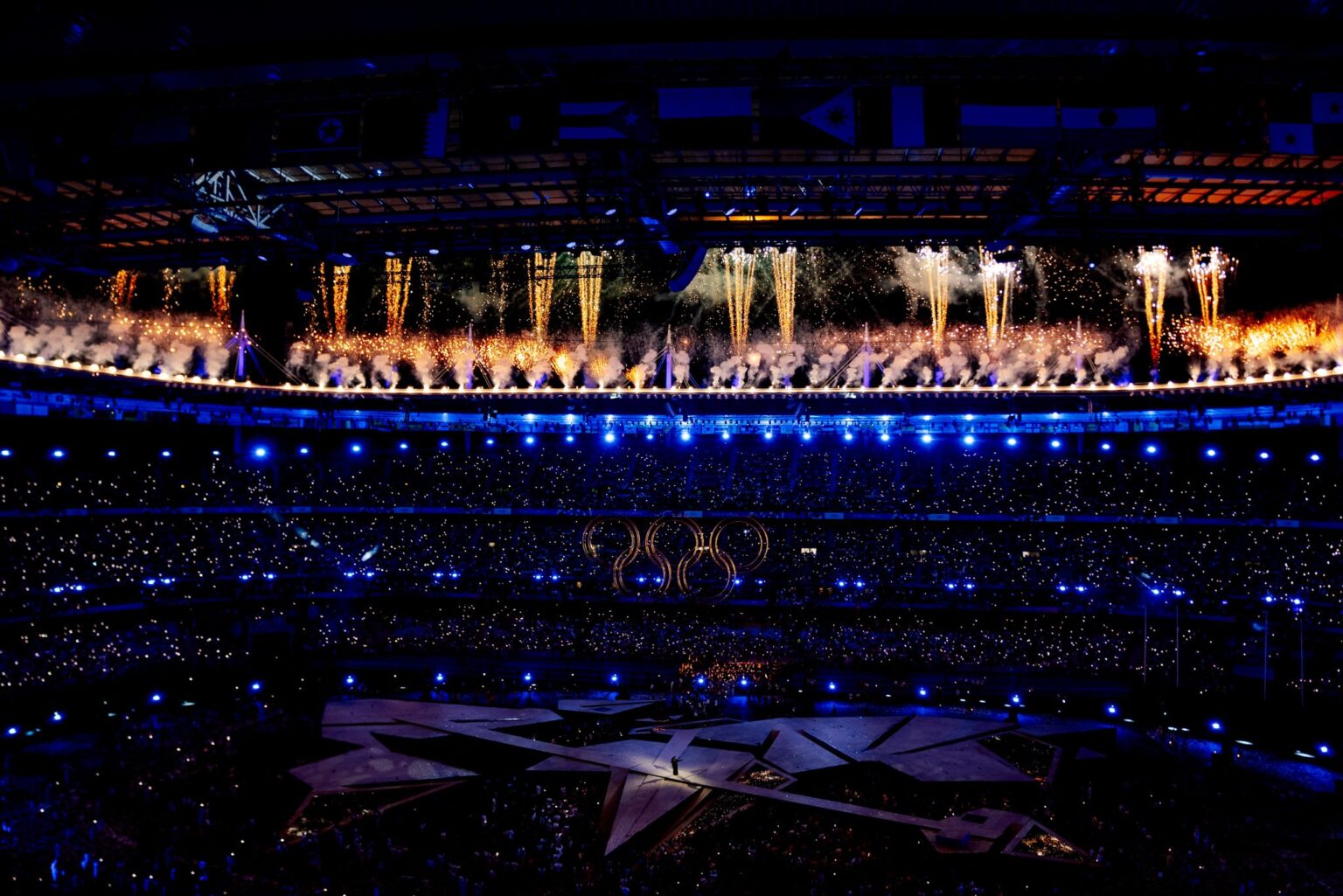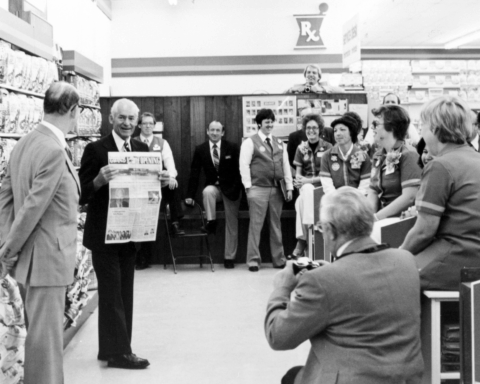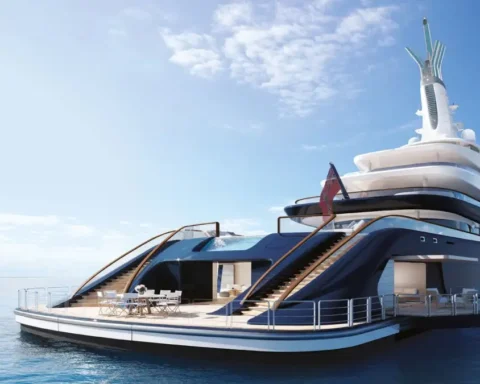Does the Paris sky bring good luck to sports lovers? The answer seems to be a big yes for both the French athletes and the organizers of the Olympic Games 2024. With 64 medals, including 16 gold, France, the host country of Paris 2024 is fulfilling its objective an unprecedented event and beyond to spread its culture beyond the stadium alone.
80,000 spectators, 10,700 athletes: On August 11, Paris once again made history with an unforgettable closing ceremony at the Stade de France, a lively moment of jubilation and emotion.
Although France was not among the top 3 national delegations to have won the most medals, a position occupied by the United States (122 medals), China (90 medals) and Australia, it did manage to secure a place in the Top 10, regaining its fifth place in the world, ahead of Great Britain (14 gold medals).
More than the medal count, the Paris 2024 organizing committee succeeded in offering games in its own way reflecting a certain cultural exception, more urban, more inclusive, more sustainable, more popular and more parity.
“Nineteen days gone by so fast and already engraved for life,” said Tony Estanguet, Olympic slalom canoe champion and President of the Paris 2024 Games Organizing Committee. And he continued in superlatives Paris 2024 being able to boast a “record audience, attendance as well as another record… that of the largest number of wedding proposals during an Olympic Games.”
A declaration of love to the world and to sport, in the image of “Sous le ciel de Paris”, sung and revisited by Zaho de Sagazan.
Atlanta record shattered
As if to exorcise the slow build-up to London 2012 and the empty stands at Tokyo 2020 (Covid obliged), the French national delegation delivered an exceptional harvest of titles and medals.
Proof that there’s no substitute for a packed and festive arena, especially at home. For the French team, the Summer Olympics were an opportunity to win 64 medals, including 16 golds, putting the French nation in fifth place in the final table of scores. A position worthy of its place in the history of the modern Olympic Games.
The French delegation beat its previous record of medals won, which dated back to the 1996 Atlanta Olympic Games.
Among the great figures to have brought French fighting spirit to the firmament was swimmer Léon Marchand, who won four gold medals (men’s 200 m individual medley, men’s 200 m breaststroke, men’s 200 m butterfly, men’s 400 m individual medley), becoming the most successful French athlete to date.
He is not, however, the most successful athlete of this Olympic fortnight. Internationally, only 26-year-old Chinese swimmer Zhang Yufei has done better, with 6 medals… bronze!
Meanwhile, Teddy Riner, the greatest judoka of all time, won two further gold medals (individual in the +100kg category and mixed), becoming triple Olympic champion.
The two emblematic athletes of these Paris 2024 Games were responsible for extinguishing the Olympic cauldron.
Also among the great French names of the fortnight were Nicolas Gestin, gold medallist in slalom canoeing, and the men’s volleyball team led by Andrea Giani against Poland.
For the first time in a hundred years, France managed to win a hat-trick, in this case in BMX, with Joris Daudet beating his compatriots Sylvain André and Romain Mahieu.
France’s16th and final gold medallist, Althéa Laurin , secured her first ever Olympic Taekwondo title.
Other notable names this season include silver medal-winning triathlete Cassandre Beaugrand and Dany Dan, Olympic runner-up in Breaking to Canada’s Phil Wizard.
An edition full of daring and panache
“And we did it our way“, enthused Thomas Jolly, artistic director of the Olympic Games, after the closing ceremony at the Stade de France.
While it is still too early to assess the economic impact of tourists visiting France and Greater Paris, we already know that 6 million tourists (+19% on a comparable basis) strolled through the City of Light during the Games, and that 9.5 million tickets were sold, according to figures provided by the Paris Tourist Office.
France succeeded in several of its bets, in particular by offering the first opening ceremony in the history of the Olympic Games to take place outside a stadium.
But the innovations don’t stop there: the Paris 2024 Organizing Committee for the Olympic and Paralympic Games has chosen to capitalize on existing infrastructures to limit the carbon footprint of staging such an event.
Located right in the heart of the city, in Paris as well as Lille, Marseille and the Paris region, the various arenas sublimated the pre-existing architectural and cultural heritage.
The arenas featured an armada of DJs playing tracks reflecting the prolific nature of French musical creation , with pride of place given to French variété (Johnny Hallyday, Claude François, Joe Dassin, Sheila…) and the French Touch sound, known for having given a new lease of life in the 2000s to old funk hits from the 1980s (Cassius, Alan Braxe, Supermen Lovers, Modjo…). The clubbing sound was also in the spotlight, with nuggets from the Nineties (Freed From Desire…) and songs from the productions of French superstar djs such as Bob Sinclar (Rock This Party), David Guetta (I’m Blue), Offenbach (Be Mine) and Bon Entendeur (Fio Maravilla).
Unusual for an Olympic competition, these soundscapes cleverly reappropriated the characteristics of the sport-show that Americans use in basketball and American soccer matches.
The closing ceremony also highlighted the electro music culture made in France that Americans, from Justice to Phoenix to Air, have been snapping up .
The Olympic Committee particularly appreciated Paris 2024’s determination to offer a great popular celebration with the very first marathon for all, which attracted almost 20,024 amateur and passionate runners late into the night in the streets of Paris. The Paris Games also saw the inauguration of the Parc aux Champions (located at the Trocadéro), a brand-new area where spectators could celebrate the athletes who had distinguished themselves the previous day.
While Athens and Rio did not shine in terms of the sustainability of their sports infrastructures, Paris 2024 has designed an Olympic village in Saint Denis, which, once the Games are over, will be converted into public housing and a revitalized district with shops and sports facilities.
The Los Angeles challenge
A key element in any closing ceremony for the Olympic Games, the ceremony on August 11 involved the lowering of the host country’s flag, the handing over of the Olympic flag and the raising of the flag of the future host delegation.
While the Olympic flag was presented to Tom Cruise, the American actor star of Top Gun and Mission Impossible, the future host flag, that of the United States, was brought by superstar gymnast Simone Biles.
Biles walked away with four medals (double gold in the individual and team competitions, Olympic champion on vault and silver medallist on floor). The flag bearer was also accompanied by Karen Bass, Mayor of Los Angeles.
A true symbol of American culture and patriotic spirit, the Star Spangled-banner or national anthem was performed by singer and guitarist Gabriella Wilson (H.E.R).
After 1932 and 1984, California’s capital will host the third Olympics in its history in 2028.
Much larger than Paris and less well served by public transport, Los Angeles is a destination that everyone has already seen, if only because of the presence of Hollywood studios, its dream factory.
A mini-movie was shown towards the end of the closing ceremony, featuring some of the City of Angels’ most iconic landmarks: the Hollywood Sign, Los Angeles City Hall,the Memorial Coliseum stadium, the upscale Beverly Hills district and its palm-lined alleys, and finally a landing on Rosie Dog’s Beach in Long Beach.
This last landing point was the occasion for a real Beach Party showcasing the American musical melting pot, with rockers Red Hot Chili Peppers, pop star Billie Eillish and West Coast rap greats Snoop Dogg and Dr. Dre.
In keeping with the American spirit, French singer Yseult – who had sung a sunny number called “Californie” on her debut album – performed “My Way”, one of crooner Frank Sinatra’s signature songs, known in France as “Comme d’habitude”, sung by Claude François.
Game is Not Over
Despite what some might consider a twilight ceremony, the festivities are not over.
From August 28 to September 8th, the Paralympic Games will take their turn in the French capital, within 12 venues, with the Olympic rings giving way to agitos.
Of the 2.8 million tickets put on sale since October 2023, 1.4 million have been sold, including 400,000 in just two weeks.
After a sluggish start, ticket sales for the Paralympic Games seem to be picking up again, surfing on the enthusiasm of French and international tourists for the Olympic Games.
The festivities kick off in the heart of the city in a fortnight’s time, with the opening ceremony scheduled to take place between the Champs-Elysées and Concorde.
In the words of Tony Estanguet, ” 4,600 athletes ready to shatter prejudices“. In other words, the closing ceremony of the Olympic Games on August 11 is “just the end of the first leg”.
We thought we were a nation of complainers, but we woke up to unleashed supporters who wouldn’t stop singing“.
All of which augurs well for the future of this international sporting event.
Read also > Paris 2024: for the opening ceremony, Thomas Jolly proves that he is indeed a beast of the Seine
Featured Photo: © Paris 2024














